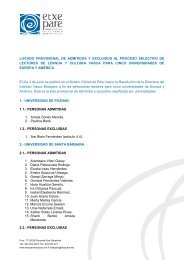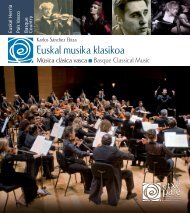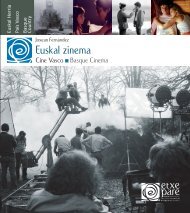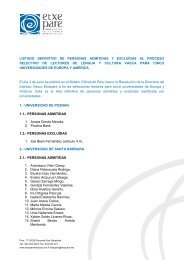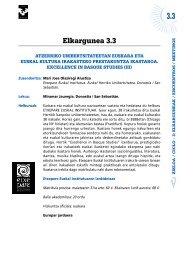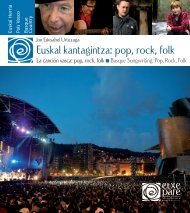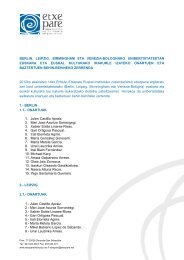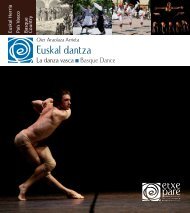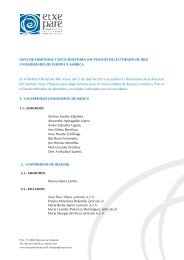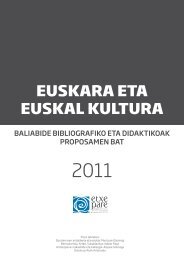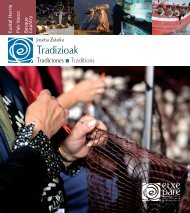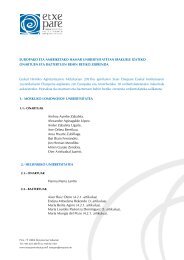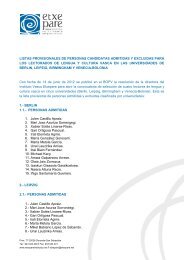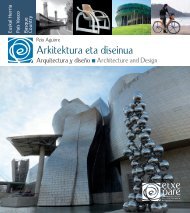XX. mendeko euskal literatura - Etxepare, Euskal Institutua
XX. mendeko euskal literatura - Etxepare, Euskal Institutua
XX. mendeko euskal literatura - Etxepare, Euskal Institutua
You also want an ePaper? Increase the reach of your titles
YUMPU automatically turns print PDFs into web optimized ePapers that Google loves.
Gasteizko hondartzak (1997), sin embargo, tienen<br />
como punto de partida la Guerra Civil y la posguerra.<br />
El objetivo de estos cuentos no es ofrecer un testimonio<br />
histórico documentado sino reflejar la situación<br />
de personas anónimas atrapadas en una dura<br />
realidad. En las narraciones del libro Baina bihotzak<br />
dio (2002), el autor narra las vivencias de varios personajes<br />
exiliados por diferentes motivos. La colección<br />
<strong>Euskal</strong> hiria sutan (2006), ganadora del Premio<br />
Euskadi de Literatura, ofrece un retrato realista de la<br />
sociedad vasca actual.<br />
Las dos colecciones publicadas por Arantxa Iturbe<br />
(1964), Ezer baino lehen (1992) y Lehenago zen berandu<br />
(1995), se centran en las relaciones de pareja.<br />
La prosa de Iturbe huye de todo artificio innecesario<br />
para recrear con gran ironía las frustraciones, soledad<br />
y malentendidos de urbanitas faltos de cariño.<br />
Las narraciones de Iban Zaldua (1966) muestran un<br />
gran sentido del humor, agudeza e ironía. El autor<br />
gusta de los juegos metaliterarios al estilo de Borges,<br />
pero acude a la cultura popular en busca de referencias.<br />
Zaldua ha publicado siete libros de narraciones:<br />
Veinte cuentos cortitos (1989), Ipuin <strong>euskal</strong>dunak<br />
(1999, junto a Gerardo Markuleta), Gezurrak, gezurrak,<br />
gezurrak (2000), Traizioak (2001), La isla de los<br />
antropólogos y otros relatos (2002), Itzalak (2004), el<br />
premiado con el Premio Euskadi de Literatura Etorkizuna<br />
(2005), y Biodiskografiak (2011). La narrativa de<br />
Zaldua huye de lo evidente; rompe con los tópicos y<br />
prejuicios que rodean a la compleja sociedad vasca a<br />
nivel literario, social y político.<br />
Poesía en euskera<br />
Damos comienzo al apartado sobre la poesía en euskera<br />
con los olerkariak. Se denomina olerkariak a los<br />
poetas del Renacimiento Vasco que elaboraron sus<br />
obras en el seno de los concursos literarios organizados<br />
por <strong>Euskal</strong>tzaleak. La asociación <strong>Euskal</strong>tzaleak<br />
fue creada en 1927 en Mondragón por un grupo de<br />
personas comprometidas con la cultura en euske-<br />
In his first book of short stories, Emakume biboteduna<br />
(1992), the writer and musician Xabier Montoia<br />
(1955) embraced the techniques of dirty realism<br />
when composing a series of short stories about love<br />
and enmity. The short stories in Gasteizko hondartzak<br />
(1997), however, address the Spanish Civil War<br />
and the post-war era. The goal of these stories is<br />
not to offer a documented historical testimony but,<br />
instead, to reflect the stories of anonymous people<br />
trapped in a harsh reality. In the book Baina bihotzak<br />
dio (2002), the author narrates the experiences<br />
of several people who have been exiled for different<br />
reasons. The collection <strong>Euskal</strong> hiria sutan (2006),<br />
winner of the Euskadi Prize for Literature, is a realist<br />
portrayal of contemporary Basque society.<br />
The two collections published by Arantxa Iturbe<br />
(1964), Ezer baino lehen (1992) and Lehenago zen<br />
berandu (1995), focus on couples’ relationships.<br />
Iturbe’s prose avoids any unnecessary artifice to recreate,<br />
in a highly ironic tone, the frustrations, solitude<br />
and misunderstandings of loveless city-dwellers.<br />
The stories of Iban Zaldua (1966) demonstrate a great<br />
sense of humour, wordplay and irony. The author<br />
likes metaliterary games in the style of Borges, but<br />
turns to popular culture in search of his references.<br />
Zaldua has published seven books of short stories:<br />
Veinte cuentos cortitos (1989), Ipuin <strong>euskal</strong>dunak<br />
(1999, with Gerardo Markuleta), Gezurrak, gezurrak,<br />
gezurrak (2000), Traizioak (2001), La isla de los antropólogos<br />
y otros relatos (2002), Itzalak (2004), the<br />
winner of the Euskadi Prize for Literature Etorkizuna<br />
(2005), and Biodiskografiak (2011). Zaldua’s narrative<br />
avoids the obvious; he breaks with the clichés and<br />
prejudices which envelop a complex Basque society<br />
at the literary, social and political levels.<br />
Poetry in Euskara<br />
We begin the section on poetry in Euskara with the<br />
olerkariak. The olerkariak were poets of the Basque<br />
renaissance who elaborated their work in contests<br />
49



